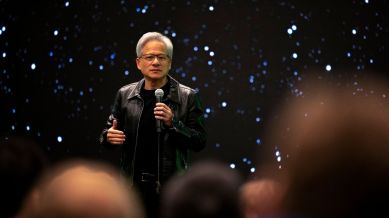Technology on smartphone reviews, in-depth reports on privacy and security, AI, and more. We aim to simplify the most complex developments and make them succinct and accessible for tech enthusiasts and all readers. Stay updated with our daily news stories, monthly gadget roundups, and special reports and features that explore the vast possibilities of AI, consumer tech, quantum computing, etc.on smartphone reviews, in-depth reports on privacy and security, AI, and more. We aim to simplify the most complex developments and make them succinct and accessible for tech enthusiasts and all readers. Stay updated with our daily news stories, monthly gadget roundups, and special reports and features that explore the vast possibilities of AI, consumer tech, quantum computing, etc.
Nvidia chips make gains in training largest AI systems, new data shows
In the fastest results for Nvidia's new chips, 2,496 Blackwell chips completed the training test in 27 minutes.

Nvidia’s newest chips have made gains in training large artificial intelligence systems, new data released on Wednesday showed, with the number of chips required to train large language models dropping dramatically.
monthly limit of free stories.
with an Express account.
The results were the first that MLCommons has released about how chips fared at training AI systems such as Llama 3.1 405B, an open-source AI model released by Meta Platforms that has a large enough number of what are known as “parameters” to give an indication of how the chips would perform at some of the most complex training tasks in the world, which can involve trillions of parameters. Nvidia and its partners were the only entrants that submitted data about training that large model, and the data showed that Nvidia’s new Blackwell chips are, on a per-chip basis, more than twice as fast as the previous generation of Hopper chips.
In the fastest results for Nvidia’s new chips, 2,496 Blackwell chips completed the training test in 27 minutes. It took more than three times that many of Nvidia’s previous generation of chips to get a faster time, according to the data.
In a press conference, Chetan Kapoor, chief product officer for CoreWeave, which collaborated with Nvidia to produce some of the results, said there has been a trend in the AI industry toward stringing together smaller groups of chips into subsystems for separate AI training tasks, rather than creating homogenous groups of 100,000 chips or more.
“Using a methodology like that, they’re able to continue to accelerate or reduce the time to train some of these crazy, multi-trillion parameter model sizes,” Kapoor said.